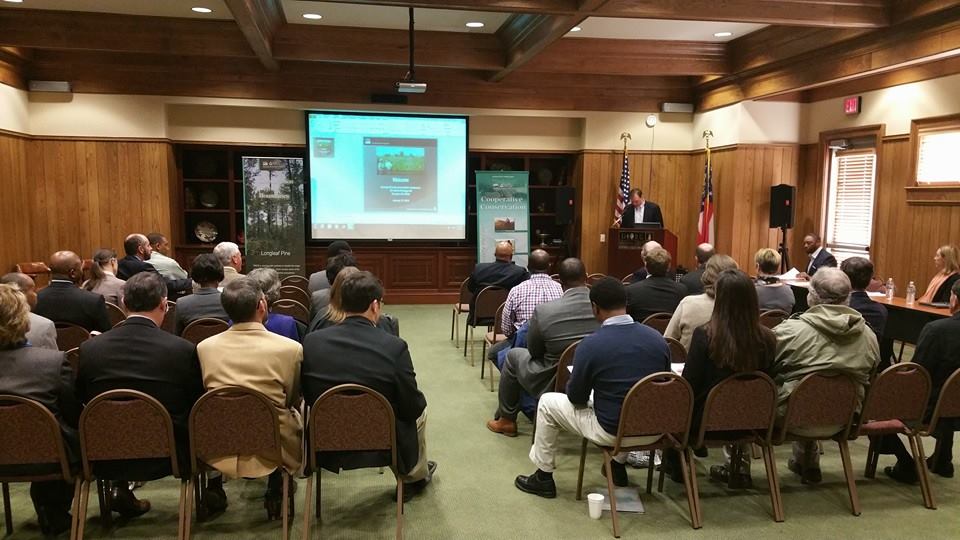Conservationists from Alabama, Florida, Georgia, and South Carolina came together January 16, for a public event held at the Georgia Forestry Association’s headquarters in Forsyth, GA. They were joined by the Under Secretary of Agriculture for Natural Resources and Environment, Robert Bonnie to receive information about projects that were selected for funding by the USDA-Natural Resources Conservation Service (NRCS) under the Regional Conservation Partnership Program (RCPP).
Bonnie was in Forsyth because earlier in the week, Secretary of Agriculture Tom Vilsack announced all of the RCPP award recipients nationwide and several of those projects in the Southeast are connected to Georgia’s landscape. These project will provide support that will accomplish a wide range of agricultural and natural resource goals. He said, “This program is going to provide incentives for those landowners to go out and protect habitat or to improve water quality… and that is critically important to all of us.”
Bonnie was welcomed to the state by the State Conservationist, Terrance O. Rudolph who was pleased to host the event on behalf of his Southeastern counterparts. He said “Our resource concerns don’t stop at the state lines. We are in this together and I’m pleased to work with my neighboring conservationists to make the communities in our region better prepared to face tomorrow.”

Among the projects discussed are efforts to increase agricultural water use efficiency on irrigated cropland in the Apalachicola-Chattahoochee-Flint watersheds. Additional presentations discussed were efforts to assist farmers with the implementation of conservation practices for livestock production, improving soil health, as well as conserving land and water resources by preserving farmland in the Savannah, Oconee, Ogeechee, Ocmulgee, Satilla and Altamaha watersheds.
The Chairman of the Flint River Soil and Water Conservation District Marty McLendon said that this is a successful partnership with an innovative approach. “Building on the foundation of successful partnership, USDA-NRCS and the Flint River Soil and Water Conservation District will expand the scope and impact of sustainable natural resource management throughout the Apalachicola-Chattahoochee-Flint River Basin and the Lower Flint River Basin….”
Athens Land Trust’s Director Heather Benham believes this is a way to help communities help themselves. “We believe that there are creative ways for local communities that value farming to create their own program that can result in more protected farms in Georgia.”
Longleaf pine forests forests once covered the coastal landscape of the Southeast, but over the past two centuries, development, timbering and fire suppression have reduced the longleaf’s range to a mere sliver of its former legacy.
Through the purchase of conservation easements one unique longleaf pine project will benefit the Southeastern region by targeting 20,000 acres of working longleaf in Florida, Georgia, Louisiana, and South Carolina that are close to 10 military installations.
The US Endowment for Forestry and Communities has developed a project with the Department of Defense and other partners, that will help protect these magical longleaf forests and maintain the lands in and surrounding military installations. While each project site has unique challenges and goals, all will support existing longleaf and gopher tortoise habitat protection efforts, while helping to maintain critical conservation areas around military bases.
Peter Stangel, senior vice president of the US Endowment for Forestry and Communities believes that protecting the longleaf pine forest will benefit everyone. “Funds from our RCPP award will be used to protect some of the most important working forests in the South. Our partners will place conservation easements on working forests that will continue to produce valuable products such as wood and fiber for paper, which will help maintain family supporting jobs associated with the forest industry in rural communities…”
Another of the Endowment’s partners, The Nature Conservancy’s Troy Ettel, director of forest conservation had this to say, “We wanted this project to be expansive, encompassing multiple states and different project sites. We believe that working with NRCS and the partners [we] can succeed in developing an innovative model for private working forests in the Southeast.”
At heart of the RCPP is the empowerment of local conservation leaders to set priorities and lead the way on conservation efforts important to their communities. This local buy in has encouraged tremendous private sector investment in conservation for the public good while also assisting private landowners. RCPP puts our partners in the driver’s seat. As a result, this new era of conservation will help keep our land resilient, the water clean, and promote economic growth in agriculture and other connected industries.
These projects, in Georgia alone brings together more than 30 groups. Among them are land trusts, management districts, nonprofits and government agencies from across the region with one goal of putting conservation on the ground.
Learn more about the RCPP or to get started with NRCS, visit your local USDA Service Center or www.nrcs.usda.gov/GetStarted.
Contact:
Article originally published at www.nrcs.usda.gov by Ron Morton, GA Assistant State Public Affairs Specialist, NRCS, Athens.

